Stay in the know on all smart updates of your favorite topics.
Doctoral Thesis

I am Sener Kaya from Turkey. I am a lecturer in Ankara/Turkey. Also I am a PhD student in sociology at Sakarya University. My thesis subject is "The Transformation Revealed by Smart City Applications in Urban Identity: Amsterdam Example". Because of my thesis, I want to come to the Amsterdam and do interviews with experts who work on smart city. If you accept, I would like to work with you. I am also member of Amsterdam Smart City.
There is no study on smart cities in the field of sociology in Turkey yet. If I finish my thesis successfully, it will be the first study. I would be very happy if you support me in this matter.
My thesis's main question is '' What kind of change/transformation do smart city applications reveal in urban identity?''.
Today, many smart city applications are made by local governments. What kind of a transformation do these studies reveal in the economic, physical and socio-cultural identity of the city that it has carried from the past to the present? How do these studies carried out by local governments respond to the social problems of individuals living in the city?These are some of the sub-questions in my research. When I decided to study this topic I noticed that smart city studies generally are about physical or economic dimensions, especially in Turkey. But In studies in Turkey, this issue has almost never been addressed with its social dimensions. Therefore, I decided that this issue should be studied. Because all the elements that make up the identity of the city should be taken into account in order for the studies to be put forward by the local governments to be holistic. This is why I chose the city of Amsterdam as an example. While the work done in the city of Amsterdam was done from the top to down in the past, the work done today is done from the bottom to up and the people are at the center. I would like to come to Amsterdam and have interviews with people and institutions working on this subject. I am waiting for good news from all of you. I hope someone else accept to work with me.
METROPOLITAN MOBILITY CONFERENCE: Building hubs for sustainable and liveable cities

eHUBS are starting to play an important part in the development of sustainable and liveable cities. As the shift to more sustainable transport becomes increasingly urgent, we must develop services which provide a real last-mile alternatives to the private passenger car. This is where eHUBS come in. An eHUB is an on-street location where electric shared mobility services, from escooters, to ebikes and cargo bikes can be found and used. These mobility hubs have the potential to significantly change the future of urban mobility, creating accessible, affordable and centralised shared mobility services. In this conference, we share experiences and exchange ideas about the current use and future of eHUBS.
The conference will explore the role of eHUBS, the lessons learned from cities pioneering them and opportunities for the future found by universities. Across two days, we hear from local authorities, universities, and mobility experts, sharing knowledge and inspiring their peers.
Several European cities are already experimenting with eHUBS, piloting the concept to create cleaner, sustainable and livable cities. This eHUBs conference is a result from the eHUBS project, which is funded by the Interreg NWE Programme, with six partner cities from five countries implementing the shared mobility concept, paving the way for others to do the same.
Free admission
Join a Virtual Reality experiment in Amsterdam

Would you like to take part in a Virtual Reality experiment? Then we are looking for you!
What is it? An indoor experiment about using Virtual Reality (VR) to study pedestrian crossing behaviour. Virtual Reality can be a powerful tool in the future to experiment with new settings and implementations before putting them into practice. Are you interested? Register or get in touch with us.
When? From 11 April until 6 May for the duration of 60-90 minutes per participant
Where? AMS Institute, Marineterrein Amsterdam, Kattenburgerstraat 5
Who? Everyone is welcome! We are looking for participants who want to join and help us make it a success! Each participant will receive a €10,- gift voucher
Register now! Here
Thanks
How can parametric analysis optimise urban design of Schinkelkwartier - the best masterplan in the Netherlands in 2021

On Thursday, March 17 Grisha Zotov pitched some of the dilemmas his team encountered during the process of urban design. Among others, he touched upon densification and building height as aspects that influence intensity of human interaction.
Located in the former industrial zone, Schinkelkwartier is an example of inclusive and interdisciplinary redevelopment. Destined to be a diverse mix-use hub, Schinkelkwartier will develop in several phases during 25 years. At an early stage local stakeholders and neighbors of the area were involved.
On behalf of Architectural Prescription Grisha raised questions about opportunities and risks offered by water-related location and complexity due to the amount of interested parties.
Suggestions, ideas and feedback are always welcome.
Local or guest, reach out and share what you think!
Just Sustainability Transitions Course

Energy, food, mobility, finance – just about every global sector is expected to transform dramatically in the coming decades. So isn’t it time you create your own transition strategy?
Do you believe, like us, that sustainability and social justice are key to fundamental change? Then join ‘Just Sustainability Transitions’: a hands-on, six-month course that provides the tools and inspiration needed to facilitate change processes.
Special: Opgavegericht innoveren op druktemanagement
Steden worden weer zichtbaar drukker. Hoe zorgen we ervoor dat we in deze tijd relevante data verzamelen om de juiste afwegingen te maken?
Gemeente Amsterdam neemt jullie graag mee in de laatste ontwikkelingen van hoe data nu worden ingezet. En welke slimme connecties zij onderling hebben gevonden, ten behoeve van drukte monitoring en management in de openbare ruimte. Leer hoe het crowd monitoring project niet alleen wordt ingezet voor een leefbare stad, maar hoe ook een nieuwe manier van werken wordt neergezet waarbij innovatie en implementatie samenkomen. We gaan graag met jullie in gesprek over de toekomst.
Locatie: Pakhuis de Zwijger (Piet Heinkade 179, Amsterdam)
Interesse in deze bijeenkomst? Stuur dan een e-mail aan Dhr. D. Groenink, d.groenink@amsterdam.nl voor een persoonlijke uitnodiging.
Er zijn een beperkt aantal plaatsen beschikbaar.
City deals: Shaping collaboration between cities

The 15th episode of the Better cities - The contribution of digital technology- series is about collaboration between Dutch cities within the City Deals in the Agenda stad en regio project.
Over the past years, the interest Dutch municipalities in digitization at urban level has increased, partly because of the initiating role of the VNG, G40, the Future City Foundation and forerunners such as Apeldoorn, Helmond, and Zwolle as well. Initially, these were small-scale and isolated projects. In this post, I'll discuss two projects that aim at scaling through collaboration.
A mission-driven approach to public sector projects
In her new book, Mission Economy, Mariana Mazzucato advocates a mission-driven approach to public sector projects at the local level in the way that a man was put on the moon. She refers at large-scale projects with a high degree of complexity, such as the energy transition, the construction of affordable housing, the well-being of the poor part of the population and the conservation of nature.
What is a mission-driven approach? At first, it includes an ambitious vision, followed by breaking down silos within the governmental organization, collaboration within the quadruple helix, and cooperation between higher and lower governments.
A mission-driven approach is appropriate for the major transitions facing the world and digitization as a part of these. The following pertains to a couple of projects that aim at such an approach. The first, Agenda city and region has been running for some time and will be dealt with extensively. The other is initiated by G40 will be discussed briefly.
Agenda stad and City deals
In Agenda city and region, cities, governments at different levels, companies, and organizations, including the VNG, G4, G40 and Platform31, work together to drive innovation in cities. The mission is summarized in SDG 11: Make cities inclusive, safe, resilient, and sustainable. The most important instrument are City Deals: collaborative ventures around a themes.
The first City Deals started in 2016, there are now 27, about half of which have been completed, but six new ones are about to start. 125 municipalities, 8 provinces, 9 ministries, 10 other government agencies, 5 water boards, more than 100 companies, 30 knowledge institutions and more than 20 other partnerships are involved. There are now 14 partnerships with municipalities outside the Netherlands.
Examples of City Deals are: Working and doing business across borders, cleantech, food on the urban agenda, local resilience against cybercrime, inner city building, the inclusive city, and smart city, that's how you do it. The latter will be discussed below.
Within a City Deal, the parties involved work together in their own way on concrete products, ranging from legislation to policy instruments. The main principles are:
- Formulating an ambition and a strategy.
- Enabling scaling through cooperation between and/or within (urban) regions.
- Realizing collaboration between public and private parties, including the central government
- Innovating by realizing new forms of problem-solving.
- Scaling up, also across national borders.
City Deals also work together and new deals are created from among them, such as ‘Smart customization', a new City Deal that arises from the existing City Deals 'Simple customization' and 'Smart city, that is how you do it'. If I had to imagine how a moonshot works, which I referred to in the introduction of this article, then Agenda city and region could be a good example.
City deal 'A smart city, this is how you do it'
The goal of this City Deal, as we read in the annual report, is to use digitization to tackle the major challenges facing Europe and the Netherlands, such as poverty, social cohesion, and insecurity, and to achieve a society in which everyone can live in freedom. 60 parties are now involved in this City Deal.
The aim is to change at least 12 processes by which regions, cities and towns are designed, organized, managed, and governed, and to make the most of the opportunities offered by digitization. The starting point is the existing practice and aimed at matching city’s demands.
The City Deal 'Smart city, this is how you do it', has 14 working groups. Each of those have chosen which a process to tackle, on the understanding that three municipalities must be prepared to test the results and can be scaled eventually. The City Deal 'A smart city, this is how you do it' has been underway for almost two years now, and the processes to be tackled have crystallized. In a few cases prototypes are ready, most are under development. Below is a brief description of the situation on November 15th, 2021. A lively description of some participants’ experience can be read in ROMmagazine, volume 39, no. 11.
1. Open urban data platform
This project is developing a procedure for tendering an open data platform, which is shareable and scalable, in which privacy and data autonomy are guaranteed and that offers sufficient precautions for cybersecurity. The result will be a step-by-step plan, in which technical questions (what it will looks like), legal questions (who is the owner) and financial questions (funding) are discussed.
2. Cookbook for effective data strategy
This project develops a procedure for the acquisition and storage of data. A 'data cookbook' has been developed that supports the collection, storage, and application of data. It offers an 11-step plan from the formulation of a measurable questions to the interpretation of the measurement results. It accentuates the importance to make explicit the assumptions behind the selection of data. The usability of the steps is tested in practice. A first concept can be found here.
3. Smart initiatives test
The aim of this project is to allow initiators (citizens, companies) to make optimal use of available public data, including those that will be provided by the DSO (digitaal stelsel omgevingswet). The DSO will provide information about which rules apply at a specific location and ultimately also about the quality of the physical living environment itself. Ideally, the ‘smart initiatives test’ will collect and optimize all data needed for a plan. The project group is currently investigating which types of (geo) data users need most ('usercases').
4. Sensor data and privacy
The aim of the project is to develop a tool that allows a municipality to tender for the installation of sensors that exactly match the type of data that will be collected and that consider ethical questions and GDPR rules.
5. Design of the new city
The growing availability of various types of (real-time) data, for example about air quality and noise pollution) has implications for the way in which cities and neighborhoods are developed. The working group is developing a canvas that functions as a ‘translator' of available data. The starting point for its development was a matrix with as inputs the phases of the design process (initiative, design and realization phase) and the area type (urban, Randstad and suburban area). This matrix must indicate which data is needed at what time. The usability will be tested through pilots.
6. Everyone (and everything) a sensor
Citizen measurement initiatives (via telephones and with sensors attached to bicycles, cars, and homes) have a double goal: to increase citizen’s involvement and to improve the insight into living environment of those who execute the measurement. It can also contribute to behavioral change, especially if the measurements match the needs of residents and they are also involved in the interpretation of the results. The working group is striving for a roadmap based on several user cases.
7. Local measurement: comparing projects
Measuring data locally – as was done in the previous project – may be redundant if data from elsewhere is available. In that case, comparability is required with data being searched for and standardization is needed to enable such a comparison. However, standardization can lead to mistrust and remove the incentive for resident groups to get started themselves. Ultimately, the working group opts for the development of a self-service portal, which will be developed together with the Healthy Urban Living Data and Knowledge Hub. Resident groups can then choose for themselves to participate in a standardized project that reads their measurement results directly or for a 'do-it-yourself' solution. A manual will be written for this last option.
Both projects are being further developed in collaboration with Eurocities, a network of 190 cities in 38 countries, under the name CitiMeasure - using citizen measurement to create smart, sustainable and inclusive cities.
8. Smart mobility: Towards a safe and sustainable city
Digitization in traffic has already taken off, for example by intelligent traffic systems (IVRIs), but usually the existing situation, for example private use of cars, is the starting point. The question is how to connect to the pursuit of a better quality of life. To this end, the working group has chosen three themes: better accessibility for emergency services, shared mobility, and city logistics.
A step-by-step plan is being developed for emergency services, with which municipalities can realize the necessary facilities to always priorize emergency vehicles – and possibly other target groups as well.
If everyone were to travel with the most suitable means of transport at that time (varying from walking, (shared) bicycle or scooter, public transport to (shared) car, private car use would decrease considerably and thus improve the quality of city live. Additionally, the working group is developing a 'map' to encourage shared mobility, which provides answers to all related questions.
Developments in city logistics are already taking place via other routes. Therefore, the contribution of the working group in this regard will be limited.
9. A business model for the smart city
New forms of collaboration between governments, the business community, knowledge institutions and citizens can result in new 'values' for areas, but also to the need to allocate costs and benefits in a different way. A new 'business model' may then be necessary. To this end, the working group is investigating the consequences for companies and organizations of entering partnerships for the successful development of products and services. This compared to more traditional client/contractor relationships.
10 Ethical Boards
Within the City Deal 'A smart city, this is how you do it', a rule is that digital instruments to be developed always comply with ethical principles. The implications of such principles are often situational. That is why municipalities are setting up an 'ethical board', which includes experts and residents. To support its work, the committee wants to create a knowledge platform that informs which ethical principles or tools suit best for different digitization projects.
11 Model Acquisition
Local authorities want to regulate the use of digital tools such as sensors in public spaces. Anita Nijboer, who works as a lawyer at Kennedy Van der Laan, who is also a partner of the City Deal 'Smart city, this is how you do it', has drawn up a model regulation for this purpose, which has already been tested in Rotterdam and Helmond. The most important learning effect is that departments within a municipality have fundamentally different view of the way in which these types of questions should be legally framed. In response to this, the working group is examining the question of whether a model regulation is an appropriate answer to obtaining consent for the use of digital tools.
12 Dealing with crowds in the city
Measuring (too large) crowds in parts of the city was a problem long before corona times. The aim is to develop a digital model ('digital twin') of the city - a so-called crowd safety manager - that provides real-time insight into pedestrian flows and concentrations. Such a model must also be able to communicate with people in the city. A prototype of a dashboard, developed by partner company Argaleo, is now being used in 's-Hertogenbosch, Breda and The Hague. This instrument does not use any personal data. It is being further developed at European level with external subsidies.
The instruments to be developed and existing instruments have been brought together via a website, the Toolbox. Other City Deals also develop knowledge, which is far from being systematically documented. That is why the best way to distribute this knowledge is investigated together with the Knowledge Lab for Urbanism.
G40: Smart sustainable urbanization
In March 2021, G40, the umbrella organization of 40 medium-sized municipalities, submitted a project proposal to promote digitalization and thus also create opportunities to the business community.
The project plan rejects the current approach of 'smart urbanization' and the realization of 'main social tasks'. Decentralization, broadening of tasks, narrowing of implementation funds and a fragmented central government policy have led to an impeding control gap and financing deficit in municipalities. Instead, a bundled approach is wanted, led by representatives of municipalities and central government, and the latter is being asked to invest € 1 billion.
When studying this plan, I was surprised by the absence of any reference to the activities of Agenda city and regioand the City Deals. Instead, one wonders whether Agenda city and region is the subject of criticism of the fragmented approach and G40 wants to get rid of it.
The strength of Agenda city and region is the cross connections between urban projects of all kinds, the involvement of citizens and intermunicipal cooperation. This is something to cherish.
In my opinion, G40 would be better off by ushering in a new phase of Agenda city and region, characterized by economies of scale and acceleration of the findings so far. The aims of this new phase could be consolidation of the cohesion between the themes of the individual City Deals within the framework of the major transitions facing the Netherlands. The theme of digitization thrives best in this context. After all, the ultimate value of digitization lies in the contribution to the energy transition, the reduction of traffic nuisance and the growth of a circular economy, to name a few examples. However, that requires a different plan.
In the meantime, I hope that in the foreseeable future we will be able to see the results of the working groups of the City Deal 'Smart city, this is how you do it', together with those of the other 'Deals'.
Follow the link below to find one of the previous episodes or see which episodes are next, and this one for the Dutch version.
Amsterdam launches bike safety innovation competition
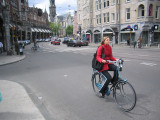
Amsterdam is inviting universities, companies and members of the public to come up with solutions to improve bike safety in the Dutch capital through an open challenge.
The central theme of the competition – “Different speeds on bicycle paths” – aims to influence the behaviour of road users and asks how bike delivery services, and differences in speed bicycle types can impact this.
Applications are open until February 24, with the winner set to be announced on April 11.
User-Centered Cycling Methods Open Toolkit

Open access toolkit of people-centered methods for urban planners, designers, and advocates to make cycling inclusive and accessible to all.
The first part of the serie 'Better cities - The role of technology' is online

Six weeks ago, I started a new weekly series answering the question how digitization can contribute to the development of better cities and their surroundings. Technology alone cannot reach this goal. Far-reaching social and economic reforms are needed, also to ensure that the benefits of digitization are shared by everyone.
Below you will find links to the articles published until now:
Part A: Digital technology as a challenge
1. Prologue to a new series: Better cities. The role of digital technologies
2. Scare-off the monster behind the curtain: Big Tech’s monopoly
3. Ten years of smart city technology marketing
4. Digital social innovation: For the social good (and a moonshot)
5. Collect meaningful data and stay away from dataism
6. The Boston Smart City Playbook
7. The Future of Urban Tech. A project of the NYC Cornell University
Next up:
Part B: Digital instruments and ethics
8. Digital technology and the urban sustainability agenda. A frame
9. Ethical principles for digital technology
10. Accessibility, software, digital infrastructure, and data. The quest for ethics
11. Ethical principles and artificial intelligence
12. Ethical principles and applications of digital technology
13. Amsterdam benchmarked
14. ‘Agenda stad’ and digital instruments
Part C: Applications
15. Artificial intelligence abused
16. Government: services and participation
17. Mobility
18. Circular economy: Construction
19. Circular economy: Waste
20. Resilience
21. Energy transition
22. Health
23. Smart cities from scratch
24. Epilogue
Links to the Dutch versions, you will find below:
I NEED YOUR HELP! - Enquête Afstudeeronderzoek ‘The effects of carsharing on individuals' travel behaviour’
Beste netwerk,
Voor mijn studie Construction Management & Engineering (CME) aan de Technische Universiteit Eindhoven ben ik op dit moment bezig met mijn afstudeeronderzoek naar de effecten van autodelen op het reisgedrag van individuen. Daarvoor wil ik een aantal minuten van jouw tijd vragen.
Hoe kun je helpen?
Door het invullen van de online enquête, help je mij bij het verzamelen van gegevens voor het onderzoek naar deze effecten. Voel je vrij om het ook te delen met je eigen netwerk.
Via onderstaande link is de online enquête te bereiken.
ONLINE ENQUÊTE: https://tueindhoven.limequery.com/143597?lang=nl
Ik wil je alvast bedanken voor de aandacht en tijd! Deelname wordt enorm gewaardeerd. Indien je verdere verduidelijking of informatie wenst, neem dan gerust contact met mij op via email (g.a.h.mutsaers@student.tue.nl)
Code the Streets is Looking for Amsterdam Pilot Participants
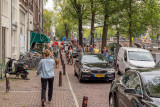
Would you like to help make Amsterdam a safer and more livable place? The Code The Streets project is looking for car drivers in Amsterdam who would like to test the TomTom AmiGo navigation app. The goal of the pilot is to support you in choosing an alternative, more 'social' route by providing you data about school zones, traffic jams, environmental zones, and vulnerable infrastructure. All you have to do is fill in a short questionnaire and download the app. The only "must" is that you're an Android user. As a token of appreciation, The Code The Streets team will be giving away a number of tickets to Move Amsterdam, including a guided tour of the interactive exhibit and a drink at Madame Cyclette. Find out more and register to join the pilot via: https://www.codethestreets.eu/
Amsterdam Reist Slim: doe mee aan de proef!

De gemeente Amsterdam en de Hogeschool van Amsterdam starten in november 2021 een onderzoek naar het reisgedrag van Amsterdammers. Een bereikbare en leefbare stad begint bij de behoeften van de inwoners. Hoe vaak, wanneer en met welke voertuigen verplaatsten ze zich door de stad? Dat zijn vragen waar we met de proef antwoord op willen krijgen.
Over het onderzoek
De proef wordt uitgevoerd met behulp van de slimme app Fynch. Fynch biedt niet alleen een helder overzicht van iedere gemaakte rit, ook de CO2-uitstoot, afgelegde kilometers, vermeden spitsuren en aantal minuten beweging per dag worden bijgehouden. De Hogeschool van Amsterdam onderzoekt het reisgedrag van Amsterdammers via de ritten in de app en stuurt tijdens het onderzoek twee vragenlijsten om nog meer te weten te komen over de reisbehoeften van de deelnemers.
Doe mee aan de proef
Woont u in Amsterdam en heeft u een auto? Meld u dan aan via onderstaande link! U draagt bij aan de ontwikkeling van een leefbare en bereikbare stad en ontvangt na afloop van de proef een bol.com bon van €20.
Join the Code the Streets pilot to contribute to a safe and liveable Amsterdam
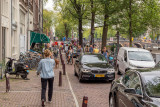
Code the Streets is a European urban mobility project that explores digital solutions to improve mobility and public space management of the future. Public and private partners from Amsterdam and Helsinki set out to answer the question: “How can cities share information with service providers on the desired use of public space and stimulate drivers to choose the most ‘social’ route?”
As metropolitan areas continue to grow, so do traffic related issues such as congestion, safety concerns, air pollution, and pressure on fragile infrastructure. In a world of digitalisation, climate change and increased awareness of the social and ecological environment, cities are faced with the challenge of finding better ways to manage urban mobility and their public spaces.
Code the Streets supports cities with this challenge by creating a basis for new digital mobility management tools and by showcasing the benefits of collaboration between the public and private sectors. Instead of just using road signs - a traditional way to direct traffic - this collaboration gives cities the opportunity to communicate with drivers through service providers. By adding data about school zones, congestion, and pollution to an existing navigation app, cities can stimulate car users to choose an alternative, and more ‘social’ route. One that is aligned with the city’s values such as safety, accessibility, liveability, and sustainability.
During the months of September and October, the Code the Streets team will run pilot programs testing the application in Amsterdam and Helsinki. Interested in trying the app? Android users can sign up here.
For more information about the pilot and the outcomes visit www.codethestreets.eu
Code the Streets is a collaboration between Aalto University, Amsterdam Institute for Advanced Metropolitan Solutions (AMS Institute), City of Amsterdam, City of Helsinki, Forum Virium Helsinki, Technical University Delft, TomTom, Mercedes-Benz and The Future Mobility Network, with support from EIT Urban Mobility.
Onderzoek: Deelmobiliteit in Almere! / Enquête
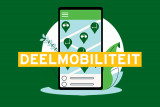
Almere is een stad waarin de mogelijkheden om jezelf te verplaatsen eindeloos zijn. Niet alle vervoersmiddelen zijn even praktisch, milieuvriendelijk of gezond. Veel van onze auto’s staan het grootste gedeelte van de tijd stil op de parkeerplaats. Ze nemen kostbare ruimte in en daarbij zorgt het gebruik van de auto voor een minder gezonde lucht.
Wat is deelmobiliteit?
Een oplossing hiervoor kan zijn om voertuigen te delen. Dit noemen we ook wel deelmobiliteit. Niet iedereen een eigen auto, maar één auto die wordt gebruikt door meerdere personen. Naast een auto kun je ook (e-)fietsen of scooters delen. Deze zijn belangrijk om bijvoorbeeld het laatste stukje van het treinstation of bushalte gemakkelijk naar je werk te komen.
De gemeente Almere is benieuwd hoe jij hierover denkt. Jouw mening kunnen we gebruiken bij het opzetten van deelmobiliteit in onze stad. We gaan betrouwbaar om met uw gegevens en de reacties worden anoniem verwerkt. Vul voor ons de enquête in!
Wat vind jij? Verdient serious gaming een stevigere plek in het aanpakken van transities?
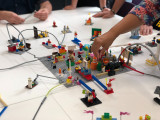
Serious gaming is een mooi hulpmiddel voor samenwerking en
besluitvorming in de energietransitie. In de afgelopen jaren hebben we
voorbeelden gezien van spellen die complexe vragen begrijpelijk kunnen maken. Neem bijvoorbeeld de HEAT tool van Alliander, het WE-Energy spel van de Hanzehogeschool Groningen, de sustainability DNA game van de Ceuvel, het Klimaatspel Plan Zuid van de Gemeente Amsterdam en het participatiespel van de Hogeschool van Amsterdam. Stuk voor stuk interessante serious games die ingewikkelde processen van verduurzamingsopgaven eenvoudiger maken.
De Hogeschool van Amsterdam en Amsterdam Smart City zoeken samen hoe we de meerwaarde van serious gaming voor energieprojecten kunnen verhogen. Enerzijds omdat we ons afvragen of de potentie wel volledig wordt benut. Anderzijds omdat opvalt dat structurele toepassing, of op grotere schaal, uitblijft. De zoektocht staat nog ver aan het begin, maar we gaan graag met anderen hierover in gesprek. En daarom vragen we jou om met ons mee te denken.
Voor wie zijn serious games?
Serious games zijn er genoeg, maar ze verschillen in de inhoudelijke focus, schaalniveau en doelgroep. Sommigen gaan uitsluitend over energie, anderen ook om andere aspecten van gebiedsontwikkeling. Daarbinnen kan het gaan over een hele regio of een bepaalde buurt. Omdat de energietransitie gaat om multistakeholder samenwerking, hebben meerdere doelgroepen baat bij het spelen van een serious game over dit onderwerp. Denk aan beleidsmakers en (nuts)bedrijven, die bijvoorbeeld moeten samenwerken om een warmtenet te realiseren.
Een doelgroep die hier niet kan ontbreken is natuurlijk de bewoner. Voor hen lijkt de toegevoegde waarde van serious games nog wel het grootst. Juist vanwege de laagdrempeligheid van een serious game is het bij uitstek een middel om mensen te helpen complexe informatie te begrijpen. Hoe meer je speelt, hoe beter je het begrijpt. En het begrijpen van een onderwerp is een belangrijke voorwaarde om mee te kunnen denken, praten en besluiten over een onderwerp. Een belangrijke reden om dit soort spellen extra serieus te nemen. Bovendien biedt een spel de mogelijkheid om gelijkwaardig met elkaar in gesprek te gaan. Verschillen in sociaaleconomische status zijn eigenlijk niet van belang. Sterker nog, spellen bieden juist gelegenheid om in elkaars schoenen te staan. Het helpt om elkaars perspectieven te begrijpen, of je nu bij de gemeente werkt, bij een netbeheerder, een woningcorporatie, of je huurder bent of woningeigenaar. Zo zijn er nog wel meer voordelen te benoemen. Voordelen die ook kunnen gelden voor andere transities dan de energietransitie.
Kansen
In de praktijk lijken we deze voordelen niet voldoende te benutten. Serious gaming voor de energietransitie is weliswaar op verschillende plekken ontwikkeld, maar in beperkte mate, en niet structureel toegepast. Daar komt bij dat we er ook weinig van weten. Welke spelmechanismes werken en welke niet? Wanneer zet je zo’n spel het beste in? Bij het ophalen van ideeën, de daadwerkelijke besluitvorming, of ook in de evaluatie? Zijn er eigenlijk ook risico’s? Zijn er redenen om serious gaming absoluut niet te willen gebruiken in het energieneutraal maken van wijken?
En dan nu de vraag aan jou!
Om de zoektocht kracht bij te zetten vraag ik namens Amsterdam Smart City onze community om hulp. Hoe kijk jij aan tegen serious gaming als middel om te werken aan transitieopgaven? Zie je de toegevoegde waarde van zo’n game voor buurtparticipatie? En van welke voorbeelden zouden we moeten leren – of wellicht als netwerk moeten door ontwikkelen?
We zijn benieuwd naar je ervaringen! Laat je reactie achter in de comments!
Students for a Circular Economy
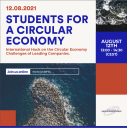
Let's tackle the most urgent challenges, together. On the 12th of August, we will bring together students from over the world from different domains to exchange knowledge, form teams and tackle circular economy challenges. This can be the opportunity for young individuals who want to use their skills for good to connect with leading companies and make a direct impact.
Looking for solutions.
Can you help Unilever create an operational model for the reuse of packaging? Do you have what it takes to help P&G reduce the environmental contribution of local product
customization? Can you help find Intel industrial symbiosis solutions for specific waste streams? These are just three of the 24 challenges that are part of the Circular Innovation Competition that are looking for a solution.
Explore all challenges at: circularsolutions.co.il
The Circular Innovation Competition.
The competition is open to anyone of any nationality above the age of eighteen - scientists, entrepreneurs, students, intrapreneurs, and other people with ideas. In short, we invite all types of innovators to submit a solution to the circularity challenges of the participating companies. Ten finalists will be selected by our jury, amongst them the President of Philips Israel and the Managing Director of Closed Loop Partners together with the challenge providers. Three winners will be declared, who will win up to 2.500 EUR together with the chance to participate in Afeka’s accelerator program for team members of the first two selected members.
Vacature Online Contentspecialist

Eet jij content als ontbijt, lunch en diner? Weet je hoe je het netwerk van de Amsterdam Economic Board kunt aanspreken en activeren? Schrijf je sterke social posts in foutloos Nederlands en beheers je de Engelse taal op een goed niveau? Heeft Google Analytics geen geheimen voor je en maak je graag deel uit van een enthousiast en betrokken communicatieteam?
De Board heeft een vacature voor een krachtige Online Contentspecialist per september voor 32 uur per week. Reageer voor 30 juli en we gaan graag met je in gesprek.
Note van ASC: Wil je net iets meer weten? Laat het Jet weten in de comments.
AMS Institute - Urban Living Lab Summer school

Build your knowledge & skills on the Living Lab approach during the online AMS Summer School 2021.
You will learn to understand what a Living Lab is and when it can be of value to start one. You’ll also gain hands-on knowledge on what is needed to have a successful start, and how to deal with issues such as stakeholder involvement and citizen empowerment.
The Summer school will challenge you to work with a new mindset, build a new network of professionals and academia. It gives you the opportunity to be a part of the next steps towards the future of one of Amsterdam’s key projects.
During the Summer school, we will help you solve the real-world challenge you bring with your team.
What can you expect?
During the week you will work in a team of 5 participants on a pre-defined real-life case. The Urban Living Lab Summer School consists of lectures, online co-working sessions, trainings, and real-world interventions. It will tap into theoretical frameworks of Living Lab methodology, process tools to help deliver a plan of approach and deploy teamwork on a real-life case. It will focus on your own learning goals for reinventing cities of tomorrow. The mix of participants - academic researchers, public professionals, and company innovation managers, with at least 5 years of experience - generates new insights and perspectives on the challenges by co-creating solutions together.
Cases we'll work on
• Case 1 – Circularity at IJburg 2
• Case 2a – Mobility hubs: area-oriented approach ‘Jordaan’ & ‘Westelijke Grachtengordel’ Amsterdam
• Case 2b - Exploration of mobility hub development at ‘Appeltjesmarkt/Europarking’ location, Amsterdam
During the week
In the week of 16 August you can expect a full-time online program running from Monday to Friday from 9:00-17:00. We expect you to be present to get the most out of it, also be there for your team. Every day you will attend inspirational lectures, participate in workshops, get personal coaching and work with your group on your case. All classes, materials and discussions will be in English.
Pricing
PhD student: € 500
Senior researcher € 900
Professional € 2000
The application deadline is July 16, so make sure to apply on time.
Note from ASC: Have a question? Let’s hear it in the comments!
Code the Streets - Creating innovative solutions for sustainable, inclusive and safe mobility.

As Amsterdam’s metropolitan area continues to grow, so do traffic related issues such as congestion, crowded streets, and increasing pressures on fragile infrastructures. Just like cities worldwide, the City of Amsterdam is faced with the challenge of finding better ways to manage urban mobility. Code the Streets wants to support cities with this challenge by bringing together cities, mobility providers and science to create sustainable and inclusive mobility solutions that keep cities liveable, now and in the future.
Code the Streets is working on improving an already existing navigation app by adding data about school zones, fragile infrastructures, congestion and pollution. We want to stimulate car-users to choose an alternative route, for example one that avoids school zones or vulnerable city infrastructure. That way we work to towards a more sustainable way of driving and make the streets of Amsterdam safer and less crowded. Starting in autumn, we will be running pilot programs testing the application in Amsterdam. Interested in trying the app? Sign up here.
Code the Streets is an European EIT Urban Mobility Project bringing together partners from Amsterdam, Helsinki and Budapest to work on innovative solutions for sustainable, inclusive and safe mobility.
Note from ASC: What do you think? Let’s hear it in the comments!
Stay up to date
Get notified about new updates, opportunities or events that match your interests.

